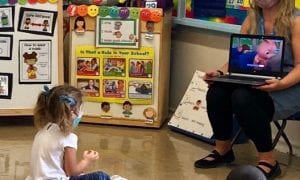
Alyson Reid accepts a donation of headphones with microphones for the Fort Meadow early Childhood Center from the Start Em Early Foundation. (JO-ANN DAVIDSON PHOTO)
WESTFIELD – Westfield Public Schools Superintendent Stefan Czaporowski presented an early childhood inclusion proposal for the district at the March 1 School Committee meeting which upset some families of Fort Meadow Early Childhood Center students.
Czaporowski said the plan is being developed in conjunction with the Franklin Avenue building project, which includes two prekindergarten classrooms in the new elementary school, a direction the district would like to go in all of the elementary schools.
Prior to the presentation, 22 letters from families whose children are currently or were previously enrolled at Fort Meadow Early Childhood Center were received for public participation, with more than a dozen read into the record before time ran out. The letters were in support of maintaining Fort Meadow as a separate early childhood center. Czaporowski said the letters came in after he gave the Fort Meadow administration and staff a heads up that the proposal was going before the School Committee.
To start, Czaporowski thanked all of the residents who wrote in regarding Fort Meadow. He said he appreciated the history and family atmosphere at the school. He said as part of the new school building discussion, the committee decided it would be beneficial to include prekindergarten classrooms. He also anticipates that the Massachusetts School Building Authority will ask to look at an early childhood plan for the district as the project moves forward. The MSBA does not reimburse for prekindergarten education or facilities.
Interim Special Education Administrator Debra Ecker said that Fort Meadow is an integrated early childhood program with peers, and all students have access to support services. She said having early childhood centers in the elementary schools, the students would still have the support services available to them.
Ecker said it is important for prekindergarten to be with same-age peers, but also to have models. She said there would be additional opportunities for inclusion, peer modeling and mentoring in neighborhood elementary schools. She said they would also have an easier transition to kindergarten and be able to maintain the same service providers.
“Not only do the prekindergarten and related services providers get to know the child, but the principal and older peers would know them, and special services would also be providing services in kindergarten,” Ecker said.
Denise Ruszala, director of Assessment and Accountability for the district also talked about the benefits of prekindergarten for English learners, which helps them to prepare for later success in school. She said early childhood education significantly impacts later academic achievement, and helps them to come equipped to kindergarten with tools.
Ruszala said the exposure to peer models helps EL students to develop basic foundational skills in language and literacy through exposure to rich oral language, and provides an early home and school connection for families.
Czaporowski said a survey done in 2019 about whether early childhood centers in elementary schools would be a benefit had a positive response of 80 percent.
Czaporowski said the Fort Meadow Early Childhood Center needs a new roof, the windows are single paned, radiators and steam traps throughout the building need to be replaced, as does all the carpeting, which they know has asbestos tile underneath. He said without consideration of asbestos abatement, the cost of needed repairs is over $1.725 million, and projected abatements could bring the cost to well over $3 million, with no hope of reimbursement.
Czaporowski said similar to the transition plan done a few years ago when the middle and intermediate schools were created, there would be a transition committee in this plan if it were to go forward. He said enrollment is currently down at Fort Meadow due to the pandemic, and making the change now would impact fewer families. He also said the elementary schools have room for early childhood classes, since the fifth grades were moved to the Intermediate School.
The majority of School Committee members acknowledged that the Fort Meadow school building was in bad shape. However, Ramon Diaz, Jr., whose children had gone through the program, opposed the plan, as did Heather Sullivan.
Diaz said peer models are enrolled at Fort Meadow and charged tuition. He said when students go to kindergarten, they will all go to neighborhood schools.
“At Fort Meadow, you have all specialists fulltime. I am really opposed to putting them all back in community schools,” he said, adding that he saw first hand the advantage of having all the professionals onsite. “I’m having a tough time. I understand all the parents that have called. It doesn’t make sense to me splitting them over all those schools, and splitting the professionals over all those schools.”
Ecker said when they talk about having typical peers in an integrated classroom, there are children on IEPs and typical peers, which would be the same in elementary school. She said the difference is children on IEPs and their peers would also go to the kindergarten, first and second grade at that elementary school.
Ecker said regarding occupational, physical and speech therapists, the students would be added to the caseloads of the specialists at the elementary school. Czaporowski later said the professionals at Fort Meadow would also be transferred to the elementary schools, as would the special equipment at Fort Meadow, something Heather Sullivan said was unique about Fort Meadow.
“If I thought our students would be receiving less services I would never support this plan,” Czaporowski said.
Cindy Sullivan said while she agreed that the district needs to get rid of the building, making the change during a pandemic was not the right timing. “I feel like in a crisis situation, we don’t make good decisions.That’s why I’m opposed to this plan right now The timing is not a good time,” she said.
Mayor Donald F. Humaso, Jr., who serves as de facto chair of the School Committee, said this was a presentation with no action to be taken at the meeting. “This is something I think we need to consider. We’ve been kicking the can down the road for some years now. When I walk in there, the family atmosphere is fantastic, but I think we have that caring atmosphere at all the elementary schools,” Humason said.
Vice-chair Tim O’Connor thanked the parents for their supporting notes and emails. “To this group, when you think all of our difficult decisions are behind us, here we go again. I haven’t heard anybody say anything against Fort Meadow. The building is breaking down. If we can’t rehab that building, there have to be different decisions made. We’re probably running out of time with the building. We have to create as safe an environment as we can,” he said.
“While I appreciate the Fort Meadow model and enthusiasm and dedication of the teachers, I would not have brought this plan forward if I didn’t think we would be able to meet the needs of the students at our elementary schools,” Czaporowski said after the meeting.







